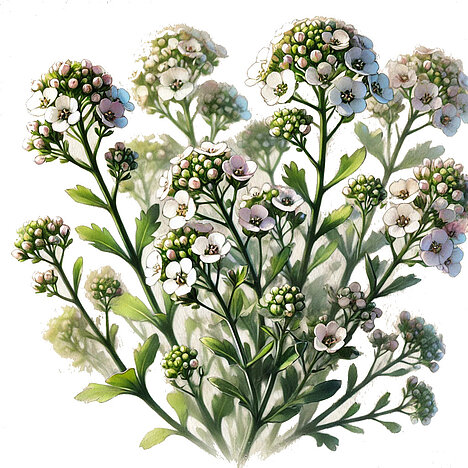Beach silverweed

Beach silverweed, often an unassuming resident of coastal regions, not only attracts the eye of the beholder with its silvery leaves and delicate flowers, but also holds a fascination for those interested in plant life and its influence on pets. But while this herb paints a picture of tranquillity and adaptability in the wild, the important question for dog owners is: is beach silverweed safe for our four-legged companions? In this article, we take a comprehensive look at beach silverweed, its properties, and the potential benefits and risks it poses to dogs.
What is sea foamwort?
Beach silverweed (Lobularia maritima), also known as sea foamwort, belongs to the cruciferous family and is mainly found in coastal areas. It is characterized by its dense, matt growth habit, silvery-green leaves and small, intensely fragrant white flowers that appear from spring to autumn. Originally native to the Mediterranean regions, beach milkweed has spread to many parts of the world due to its hardiness and adaptability.
Benefits of beach milkweed for dogs
Natural curiosity and sensory stimulation
One of the benefits of beach milkweed is its ability to enrich the sensory world of dogs. The unique textures and intense scent can stimulate a dog's curiosity and senses, leading to increased mental stimulation. Such natural exploration is important for dogs' cognitive development and well-being.
Potential health benefits
Although specific studies on the effects of cordgrass on dogs are lacking, plants in the cruciferous family often contain compounds that have antioxidant properties. In small amounts, the herb, if free of pesticides and other chemicals, could potentially contribute to diversity in the diet.
Risks and disadvantages
Toxicity and allergic reactions
A major risk associated with the consumption of beach silverweed by dogs is the potential toxicity of certain parts of the plant or the risk of allergic reactions. Symptoms of such a reaction can range from mild digestive upset to more serious conditions such as respiratory problems, depending on the sensitivity of the dog and the amount consumed.
Environmental contaminants
Because beach silverweed often grows near the coast, it can absorb contaminants from its environment, such as salt, heavy metals and pesticides. These contaminants could lead to health problems if consumed by dogs.
Better safe than sorry
While beach silverweed is a fascinating plant with potential benefits for sensory stimulation in dogs, the risks outweigh the benefits if handled inappropriately. Dog owners should be especially careful if their pets have a tendency to eat plants. It is recommended to keep dogs away from beach silverweed and other unfamiliar plants to minimize the risk of toxicity and allergic reactions. If your dog has accidentally eaten any part of this plant and is showing unusual symptoms, it is advisable to consult a vet immediately. By creating a safe environment for our four-legged friends, we can help them live a long and healthy life by our side.
If you notice any signs of hypersensitivity or poisoning in your dog, you should see your vet immediately. We are not a substitute for a vet, but we try to be as accurate as possible. Every dog reacts differently and we recommend you get a second opinion or consult your vet if in doubt.
Stay healthy and take good care of your four-legged friend!😊